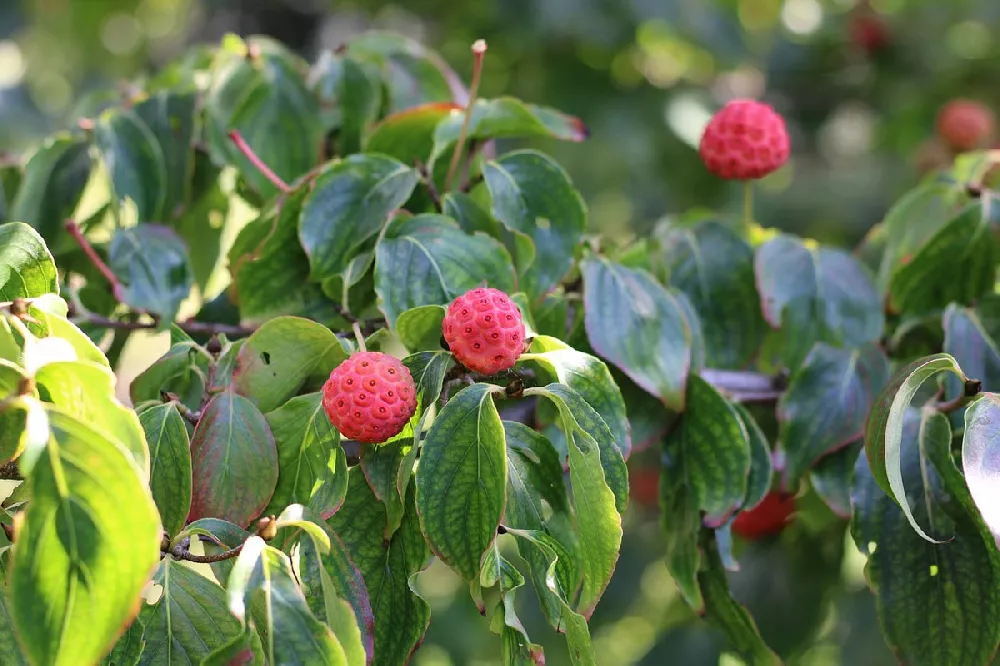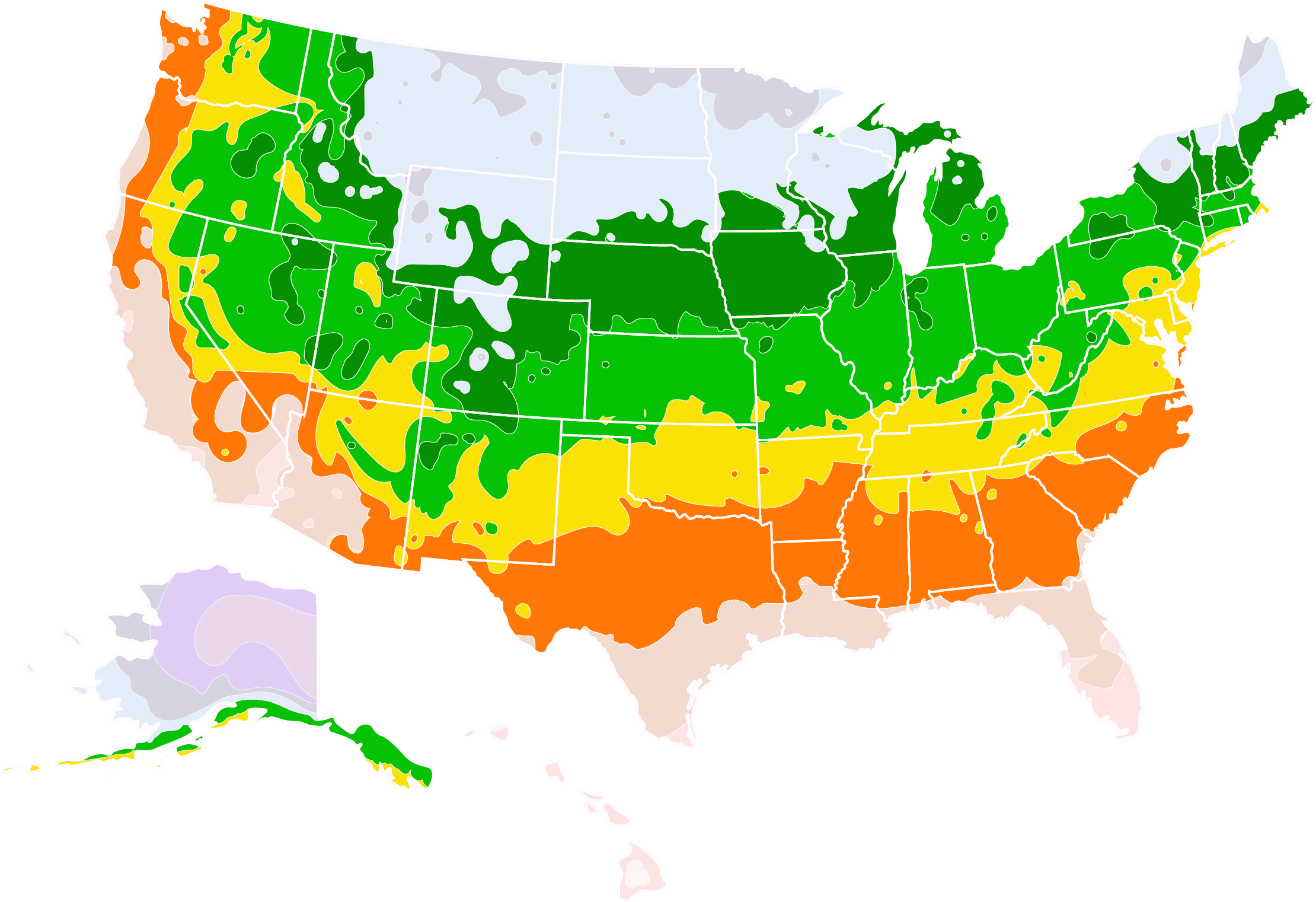Kousa Dogwood for Sale - Buying & Growing Guide
- Ships in 1-2 days
- 1-Year Warranty Eligible
- Pots or accessories are not included unless specified in the product options.
Shipping Details:
Once your order is shipped, you’ll receive an email with a tracking number and estimated delivery date. Most orders ship immediately, but some items are seasonal and may only ship in spring or fall. These products are noted on the website.
If you're looking for a tree with four-season interest, look no further than the kousa dogwood, Cornus kousa. In spring it's a mass of starburst-like white bracts. In summer the attractive dark green leaves and vase-like shape make it a garden focal point. Fall sees spectacular color, and in winter, the attractively mottled bark provides eye-catching interest in the garden. This small tree, which maxes out at 15 to 25 feet in height, works even in smaller gardens, and it can be placed under power lines without fear of interference. Here are a few more reasons why you need a kousa dogwood in your garden:
- Red, berry-like fruit attract songbirds of all types.
- Shallow root system means you can plant it near buildings, walls, or sidewalks without root damage.
- More disease-resistant than other types of dogwood.
Plant Care
Sunlight

The kousa dogwood tree thrives in full sun or partial shade with at least four hours of direct sun a day.
Watering
Water newly planted saplings every day until established; taper off when you see new growth. Trees like moist soil.
Fertilizing

Fertilize in the spring with a slow-release product such as a 12-4-8 or 16-4-8 formula. Avoid over-fertilizing.
Planting and Care
Planting instructions
Choose a site for your kousa dogwood tree with rich, acidic soil that drains well. The trees need at least four hours of direct sun daily, and will thrive with morning sun and afternoon shade. Dig a hole that’s twice as wide as the sapling’s root ball and just as deep. Till the soil in the bottom of the hole to loosen it. Unpot your sapling, teasing out encircling roots so they don’t girdle the tree, which can kill it slowly. Place the tree in the hole and, while holding it upright, fill in around it with good quality soil, tamping down as you go to remove air pockets. If the tree seems wobbly, stake it for a year or so until the roots are established. Add a 2- 3-inch layer of mulch around the tree, taking care that it doesn’t touch the trunk.
Watering and nutrients
Kousa dogwood trees like their soil moist. Water newly-planted trees several times a week until you see robust new growth. At that point, scale back to once-a-week waterings. Mature trees may need water if your weather is very dry. Dig a hole 2 inches down near the root zone, and, if the soil is dry at that depth, give the tree a thorough watering. Use a balanced, slow-release fertilizer, applying a light dressing in April and May. Avoid over-fertilizing, which can damage the roots.
Pollination
The kousa dogwood tree is monoecious, meaning that male and female plant parts are on a single tree. The tree flowers in early summer, and is pollinated by insects such as honeybees. Pollinated flowers lead to berry-like seed clusters in fall.
Pruning
Kousa dogwood trees need only light pruning to remove damaged or diseased branches. The tree should grow into its natural vase-shape with little shaping. You can also prune out suckers that occur at the base of the tree, and lower branches that interfere with lawnmowers.
Pests and diseases
The kousa dogwood is not as vulnerable as native dogwoods, but there are a few pests and diseases to watch for. Borers such as the dogwood borer may leave holes and tunnels in the bark, where they lay their eggs. Aphids can be a problem, as well, but can be combated with neem oil. Kousa dogwood trees may experience scorch, which happens when the tree is getting too much sun and not enough water. Leaf spot diseases such as septoria leaf spot may also impact the trees. Keep the area around the base of the tree free of leaf litter, and dispose of or burn any diseased branches.
Achieving maximum results
It’s never a bad idea to have a soil test done before you plant your kousa dogwood tree. Although they are fairly forgiving trees that will grow in a wide range of environments, they do like acidic soil. If your soil is more alkaline, there are products on the market, called soil acidifiers, that can adjust the soil’s pH. A soil test will also highlight any missing nutrients or micronutrients, which should be your guide when you are applying fertilizer. Keep applications of fertilizer on the light side. Too much and you risk burning the roots.
FAQs
Where does the kousa dogwood grow best?
Kousa dogwood trees will thrive in USDA hardiness zones 5 to 8, which includes most of the temperate U.S. Only southern tropical regions and the far northern states are out of its comfort zone. In theory, the kousa dogwood could be grown in these regions in a large container, but they do not do well when pot-grown, and it's not recommended.
How is the kousa dogwood different from regular dogwood trees?
Kousa dogwoods, which are native to Japan and East Asia, are somewhat smaller than the U.S.-native flowering dogwood, and they flower about a month later. The drupes (fruits) are different, as well, with kousa fruits looking like a large raspberry and flowering dogwoods appearing as shiny, oval berries. The kousa dogwood is more likely to grow as a multi-trunk small tree or large bush, and it is more disease-resistant than its American cousin.
Are kousa dogwoods fast-growing trees?
Although they're not speedy growers, a healthy kousa dogwood tree can put on anywhere from 12 to 24 inches of new growth a year. This growth will level off once they reach their full height.
Compare Similar Products
You can't add more Product Name - Product size to the cart.
OK










